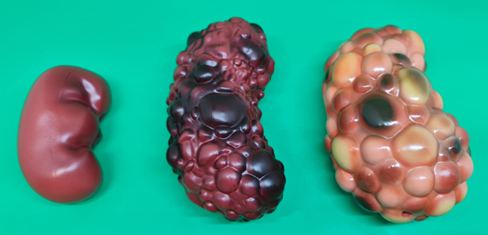Finally there is hope for patients with polycystic kidney disease
Author:
dr. Sugemay Indra
Senior Medical Advisor Otsuka Indonesia
(Dept. Medical Affairs TMBG)

Renal polycystic disease or called Autosomal Dominant Polycystic Kidney Disease (ADPKD) is an inherited kidney cyst disease and this disease is caused by mutations of the PKD1 and PKD2 genes that cause changes in the effect of vasopressin-2 in the kidneys which initially function to absorb water to prevent the body from lacking fluid which turning into increasing fluid secretion to cysts and increasing the formation of cyst cells, These two things will cause the growth of kidney cysts that are increasing in its size and its number. This condition will continue to develop which will eventually lead to a decrease in kidney function and even kidney failure.
This Polycystic Kidney Disease can appear from birth or adolescence and continue to develop. When they are 50 years old, the symptoms begin to appear where symptoms of hypertension or nefrologic pain and also other kidney disorders such as blood in urine, kidney stones or urinary tract infections. When this symptom appears, the size of cysts formed are quite large because there is an adaptation mechanism in the initial phase. So it is very important to be able to detect this disease as early as possible by screening the families of patients whose affected by ADPKD.
dr. Dwi Lestari, SpPD-KGH as a nephrologist in Semarang and at Telogorejo Hospital said, "The risk of ADPKD disease herited to the family by up to 50% and if there is a family member who diagnosed with ADPKD, do the screening as soon as possible because ADPKD will not miss a generation where every generation can appear ADPKD disease. So the earlier it is diagnosed, we can slow its progression. The tips is drink lots of water, food arrangements and Tolvaptan (Jinarc) “
Previously, patients with polycystic kidney were faced with no choice to become kidney failure, because there was no specific therapy for this condition. Patient even felt guilty because this polycystic kidney condition is an inherited disease and of course this greatly affects the physical and psychic of the patient. According to some nephrologists, patients should be consulted to psychiatrist in order to prepare patients for renal failure conditions. This also makes patients and nephrologists desperate and hopeless because there is no therapy that can be used for this polycystic kidney disease.
Finally, there is hope for ADPKD patient by the presence of Tolvaptan which has approval from BPOM and FDA for use in patients with ADPKD or polycystic kidney disease. In studies using Tolvaptan there’s evidence that Tolvaptan can delay the deterioration of kidney function and delay the enlargement of kidney volume. Administration of Tolvaptan, has also been proven to reduce pain and kidney stones.
dr. Aida Lydia, SpPD-KGH, as the head of Pernefri and ADPKD team said "Tolvaptan has given hope to patients and families. Because of its administration must be in high doses, it is necessary to becareful and need evaluation periodically".
The use of tolvaptan for ADPKD uses a fairly high dose so that there is a risk for side effects, especially side effects to the liver and the risk that the patient will urinate frequently. For that, a good understanding of the doctors and patients are needed to prevent and overcome the risk of this side effect. In its implementation, it is necessary to apply a Risk Management Plan (RMP) with the aim that patient get more benefits from Tolvaptan drug therapy with minimal side effects.
The use of Tolvaptan for ADPKD has been approved in several countries such as the USA, Canada, Japan and in Indonesia. Therefore Tolvaptan will become a new hope for doctors, patients and families in Indonesia.
